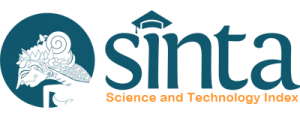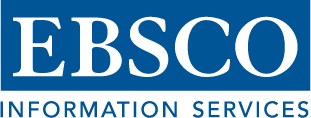Missionary Thinking in the Perspective of Adult Education Principles and Bible Study
Abstract
Adult education is formulated as a process that fosters a desire to ask questions and learn continuously throughout life. The study aims to answer the questions: What is the Bible as the basis for teaching design? What are the characteristics of adult education? What is the correct and effective formulation of a missionary for adult education? The answers are: 1) The Bible as the basis for teaching design means Bible values are the source and guide of all curricula; 2) Characteristics of adult education, both in the field of work and other experiences, are independent, think for their interests (future) and have diverse backgrounds; 3) Appropriate and effective missionary Bible studies for adult education are as follows: a) curriculum that reflects God's missionary vision (Missio Dei); b) a curriculum model for a missionary approach that uses information, stimulation, or projection and a learning process for missionary approach which is developed based on the interests of adults by integrating all forms of activities.
Keywords
Full Text:
PDFReferences
Andrian, Tonny, David Ming, G.P. Harianto, and Muner Daliman. “The Concept of Time Management Based on Ephesians 5:15–17 and Relevance to Contemporary Christian Leaders.” HTS Teologiese Studies / Theological Studies 77, no. 3 (2021): a6425. https://doi.org/10.4102/hts.v77i3.6425.
Busse, R., J. Lischewski, and S. Seeber. “Do Non-Formal and Informal Adult Education Affect Citizens’ Political Participation during Adulthood?” JSEE 18, no. 3 (2019): 4-24. https://doi.org/10.4119/jsse-1443.
Cai, Vanessa Jiaxin, and Ai Noi Lee. “Growth Mindset, Perceived Support and Intention to Pursue Continuing Education Courses among Working Adults.” Nanyang Technological University (NIE Digital Repository), 2018. Accessed March 1, 2022. https://repository.nie.edu.sg/handle/10497/21244.
Camerling, Yosua Feliciano, and Hengki Wijaya. “Misi Dan Kebangkitan Rohani: Implikasi Misi Allah Bagi Gereja.” Jurnal Ilmiah Religiosity Entity Humanity (JIREH) 1, no. 1 (June 18, 2019): 57–71. https://doi.org/10.37364/jireh.v1i1.11.
Coles, E. K. Townsend. Adult Education in Developing Countries. Oxford, United Kingdom: Pergamon Press, 1977. Accessed February 24, 2022. https://www.cabdirect.org/cabdirect/abstract/19781843981
Darsana, I. K., M. Daliman, S. Warnomartoyo, S. Wahyuni, & Jamin Tanhidy. “The implementation of Jesus’ transformative leadership in leaders and activists of the Protestant Christian church in Bali, Indonesia.” International Journal of Humanities and Innovation (IJHI) 4, no. 4 (2021): 149-153. https://doi.org/https://doi.org/10.33750/ijhi.v4i4.131.
Desjardins, Richard, Alexandra Ioannidou, R Desjardins, and A Ioannidou. “The Political Economy of Adult Learning Systems—Some Institutional Features That Promote Adult Learning Participation.” Zeitschrift für Weiterbildungsforschung 43, no. 2 (June 18, 2020): 143–168. https://doi.org/10.1007/s40955-020-00159-y.
Doyle, Tom, and Malcolm Brady. “Reframing the University as an Emergent Organisation: Implications for Strategic Management and Leadership in Higher Education.” Journal of Higher Education Policy an d Management 40, no. 4 (July 4, 2018): 305–320. https://doi.org/10.1080/1360080X.2018.1478608
Dunn, James D. G. Word Biblical Commentary (WBC) Romans 1-8. Dallas: Word Incorporated, 1991.
Elfindri, Supriadi Rustad, Nizam, and Dahrulsyah. “Lecturer Performances in Indonesia Higher Education System.” IJAEDU- International E-Journal of Advances in Education 1, no. 1 (April 18, 2015): 26–36. http://ijaedu.ocerintjournals.org/tr/pub/issue/7959/104518.
Foley, Griff. Understanding Adult Education and Training. Sydney: Allen & Unwin, 2000.
Foley, Griff. Dimensions of Adult Learning: Adult education and training in a global era. Oxfordshire: Routledge, 2020.
Griffin, Colin. Curriculum Theory in Adult and Lifelong Education. London: Routledge, 2018. https://doi.org/10.4324/9780429454479.
Harianto, G. P., Rusijono, Siti Masitoh, and W. H. Setyawan. “Collaborative-Cooperative Learning Model to Improve Theology Students’ Characters: Is it Efective?” Jurnal Cakrawala Pendidikan 39, no. 2 (June 19, 2020): 409–421. https://doi.org/10.21831/cp.v39i2.31272.
Hochanadel, A., and D. Finamore. “Fixed and Growth Mindset in Education and How Grit Helps Students Persist in the Face of Adversity.” Journal of International Education Research 11, no. 1 (2015): 47-50. https://doi.org/10.19030/jier.v11i1.9099.
Hurlock, Elizabeth B. Psikologi Perkembangan : Suatu Pendekatan Sepanjang Rentang Kehidupan. 5th ed. Jakarta: Erlangga, 2006.
Jarvis, Peter. Adult Learning in the Social Context. London: Routledge, 2012. Accessed March 1, 2022. https://doi.org/10.4324/9780203802724.
LeBar, Lois E. Education That Is Christian. 2nd ed. Colorado: Chariot Victor Publsihing, 1995.
Lee, Hyo-Young. “The Effect of Positive Psychological Capital on Participation in Lifelong: Mediating Effects of Self-Directedness to Learning.” KoreaScience 19, no. 3 (2018): 198–209. Accessed March 1, 2022. https://www.koreascience.or.kr/article/JAKO201810648288458.page.
Wenas, Maria Lidya, Elsi Susanti Br Simamora, Maharin Maharin, Candra Joni Apri, and Rifka Priskila. “Nilai-Nilai Kristiani Bagi Kompetensi Kepribadian Guru.” Skenoo 1, no. 1 (June 30, 2021): 1-10. https://doi.org/10.55649/skenoo.v1i1.3.
Lobang, Medy Martje dan Yosua Feliciano Camerling. “Learning Media and Congregational Education Curriculum in an Online-Based Church to Face Globalization Changes in the 21st Century.” Jurnal Ilmu Teologi dan Pendidikan Agama Kristen 2, no. 1 (Juni 2021): 61-78. https://doi.org/10.25278/jitpk.v2i1.488.
Mallangi, Natalia, and Ivan Th. J. Weismann. “Pengaruh Kurikulum 2013 pada Mata Pelajaran Pendidikan Agama Kristen terhadap Perkembangan Spiritual Anak Kelas 4 & 5 SD Kristen Kalam Kudus Makassar.” Jurnal Ilmu Teologi dan Pendidikan Agama Kristen 2, no. 1 (2021): 15-35. https://doi.org/10.25278/jitpk.v2i1.517.
Morris, Leon. The Epistle to the Romans. Grand Rapids: W.B. Eerdmans, 1988.
Mudhoffir. Teknologi Intruksional. Bandung: Remaja Rosdakarya, 1990.
Reimer, Kevin S., M. D.Goudelock Brianne, and Lawrence J. Walker. “Developing Conceptions of Moral Maturity: Traits and Identity in Adolescent Personality.” The Journal of Positive Psychology 4, no. 5 (September 2009): 372–388. https://doi.org/10.1080/17439760902992431.
Satori, Djam’an, and Aan Komariah. Metodologi Penelitian Kualitatif. Jakarta: Alfabeta, 2017.
Schleicher, Andreas. “The Impact of COVID-19 on Education: Insights from Education at a Glance 2020.” Accessed February 24, 2022. https://www.voced.edu.au/content/ngv:87789
Sidjabat, B. Samuel. Strategi Pendidikan Kristen : Suatu Tinjauan Teologis - Filosofis. Yogyakarta: Yayasan Andi, 1994.
Simanjuntak, Ika Widyasari, and Talizaro Tafonao. “Urgenitas Dalam Menerapkan Kurikulum Pendidikan Agama Kristen Bagi Orang Dewasa Di Gereja.” Harati: Jurnal Pendidikan Kristen 1, no. 1 (April 21, 2021): 85–100. https://doi.org/10.54170/harati.v1i1.34.
Sukardi. Metodologi penelitian pendidikan kompetensi dan praktiknya. Jakarta: Bumi Aksara, 2014.
Suprijanto. Pendidikan Orang Dewasa. Jakarta: Bumi Aksara, 2007.
Sugiono. “Paul’s Contextual Evangelistic Approach Based on Acts 17: 16-34.” Jurnal Ilmu Teologi dan Pendidikan Agama Kristen 1, no. 2 (Desember 2020): 87-102, http://doi.org/10.25278/jitpk.v1i2.492
Tanhidy, Jamin. “Teologi Misi Bagi Gerakan Misi Dan Komunikasi Kristen Pasca Pandemi Covid-19.” Jurnal Teologi Kontekstual Indonesia 2, no. 1 (August 26, 2021): 1–10. https://doi.org/10.46445/jtki.v2i1.377.
Tanhidy, Jamin, Priska Natonis, and Sabda Budiman. “Implementasi Pelayanan Lintas Budaya Dalam Gereja Berdasarkan Kisah Para Rasul 10:34-43.” LOGON ZOES: Jurnal Teologi, Sosial dan Budaya 4, no. 2 (September 14, 2021): 124–134. https://doi.org/10.53827/lz.v4i2.48.
Vine, W. E. Vines’s Expository Dictionary Of New Testament Words; Unabridged Edition. Missouri: Mac Donald Publishing Company, 1985.
DOI: http://dx.doi.org/10.25278/jj.v20i2.656
viewed = 0 times



















